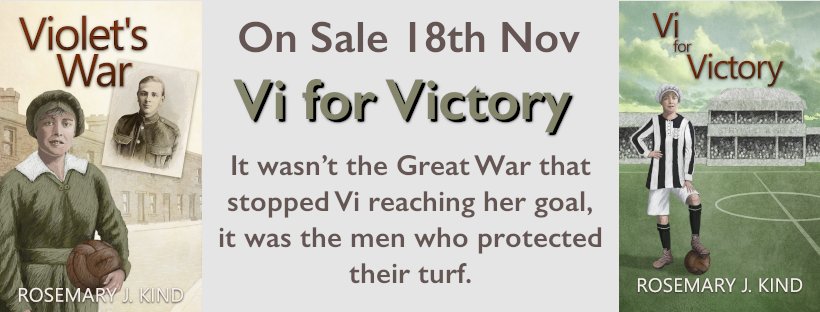
100 Years since the Football Association Banned Women’s Football
In December 1921 the Football Association banned women’s football from being played in any of its members’ stadiums. That decision stopped the growth of women’s football. The ban was in place for fifty years. It has taken the following fifty years for women’s football to recover and earn its rightful place alongside the men’s game.
This year, historical fiction author Rosemary J. Kind has launched two novels bringing the story of the women’s game during World War One to life. The story culminates with the FA ban. “Fifty years ago at junior school we asked to have a girls’ football team,” says Kind, talking about her motivation for writing the books. “The request was refused. We were incensed but understood nothing of the background to the decision. It was only a couple of years ago, reading an article about the ban, that the picture became clearer.”
Munitionettes
Inspired by the story of the Dick, Kerr Ladies team of munitionettes in Preston, Kind researched life for young women during WW1 as the basis of the story. “The hardship faced by so many families at the time and the light relief which football could bring to their lives moved me,” says Kind. “Young women took up dangerous work in munitions factories to support their families while husbands, sons, fathers went away to fight. Many young men didn’t return and others who came back were seriously injured. Women’s football raised huge sums of money to help with war relief.”
Prior to the ban, women’s football could draw crowds of over 50,000 spectators and ran in parallel to the men’s game when teams were reinstated after WW1. There was extensive prejudice against the game in the early days, but over the war years it became firmly established as a fund raiser for the many charitable war relief causes, even after the war had finished. The real reasons for the ban can only be surmised. The explanation given at the time of the game being ‘unsuitable for females’ having been declared by a medical doctor as ‘injurious to women’s health’ was clearly ill-founded. The second ground given related to financial recompense but, at a time when men’s football was turning professional, it would have been impossible for working women to play matches and lose earnings by doing so.
“I wanted Violet’s War and Vi for Victory to make the story more widely known and celebrate all that has been achieved since in the game and in the fight for equality,” says Kind.
Both books are available in Paperback and Ebook and are available HERE